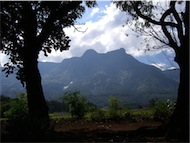[ ](http://www.flickr.com/photos/johnau8ust/sets/72157600842360494/)I have all my photos from my visit to Mulanje, Malawi up on Flickr for the world to see. You can check them out [here](http://www.flickr.com/photos/johnau8ust/sets/72157600842360494/).
](http://www.flickr.com/photos/johnau8ust/sets/72157600842360494/)I have all my photos from my visit to Mulanje, Malawi up on Flickr for the world to see. You can check them out [here](http://www.flickr.com/photos/johnau8ust/sets/72157600842360494/).
You may want to use the “View as slideshow” link. If you do, you’ll notice a floating lower-case “i” over the center of the main photo. (You may need to mouse over it to make it appear.) Click it, and you can see all of the captions.
Malawi is a land-locked country in southern Africa. A former British colony, it is now one of the poorest nations on Earth. It’s been especially hard-hit by HIV/AIDS, losing a huge portion of its 20 to 40-year olds. Young parents, especially. It’s now a nation of children and old people.
[FOMO](http://www.fomo.co.uk/) (Friends of Mulanje Orphans) runs 10 centers, providing services to 4,000 orphans. Ryan and I visited to help repair and repaint the Gulumba Centre, and to meet the kids who are doing remarkably well in remarkably difficult circumstances.
We also visited medical clinics, in the hopes of establishing a presence for [U.S. Doctors for Africa](http://www.usdfa.org/). Treatable diseases like malaria are a huge threat, and the lack of medicine and infrastructure is crippling.
 For all its challenges, Malawi is incredibly beautiful, as are its people. It’s like an island nation without an ocean.
For all its challenges, Malawi is incredibly beautiful, as are its people. It’s like an island nation without an ocean.
So what now? I’m still figuring that out.
Obviously, FOMO will continue to need financial support, and I can help with that.
But I think there are unique opportunities in Malawi. It’s stable and English-speaking. It’s infrastructure is lacking — its roads in particular are a mess — but the lack of embedded choices can be a blessing. If there’s any place perfect for leapfrogging to the Next Better Idea, it’s Malawi.
The main reason I wanted to blog about the trip is that I’ve always been kind of uncomfortable-slash-terrified about the developing world and global poverty. And I suspect most readers are, too. It’s overwhelmingly macro.
But when you look at it in the micro scale, it’s not nearly so intimidating. I didn’t leave with any big answers, but I now know a bit about keeping kids fed. And how to install a corrugated metal roof. (You nail through the peaks, not the valleys, with capped nails.) I spent most of my time painting walls, and watching. Learning.
Obviously, not everyone is in a place financially to book a ticket to the other side of the world and just help out. (That’s what Ryan and I basically did.) But a lot of my readers are young — in college, or just after that — which is a perfect time to head out and explore the world. If any part of you is thinking about doing that, trust your instincts.